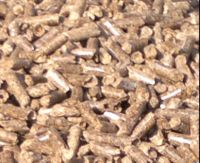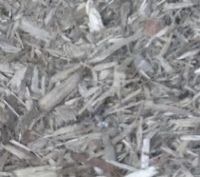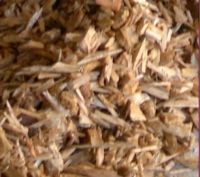
The boilers page gives a brief breakdown of the types of boilers available and their maximum moisture tolerance. However, selecting a fuel is not as simple as just sticking below the maximum moisture stated by the boiler manufacturer. All biomass boilers require an extensive 'tuning' process, carried out as part of the commissioning. Most modern systems, excluding basic log and batch burners, incorporate oxygen sensing technologies to automatically compensate for small variations in the fuel with time. Whilst lambda control programs can very successfully compensated for small variations within a silo or between loads, they are not capable of making the adjustments required when the fuel moisture content varies significantly. M.Baxter biomass can advise on the range of fuel moisture content which will not cause operational problems for a given boiler.
For wood pellet systems, the particle sizes available are either 6mm or 8mm diameter pellets. 6mm is the European standard, and despite an early trend by the UK pellet industry towards production of 8mm pellets, it is now becoming the standard size here in the UK. Larger boilers with rigid auger systems can be configured to burn both, but for flexible auger systems 8mm pellets should be avoided. Dust levels should be as low as possible; it is important to recognise that dusty pellets does not always signify a fault with the pellet manufacturer - excessive length or number of bends in the fuel delivery system can cause mechanical degradation of the pellet, as can the absence of a suitable pellet impact mat in the fuel store, or a poorly designed bunker or fuel feeding system. It should also be noted that while high dust levels can cause problems for certain types of boilers, clinker formation is in no way linked to the dust content of the fuel. Clinker formation is the most significant factor in wood pellet fuel quality, and can make operating the system a big headache for the user. The key factors are the melting temperature of ash residues, and the percentage of ash in the fuel. Commonly, pellets with a higher ash content than normal are contaminated with non-wood products; These contaminants have the effect of reducing melting temperature of the ash allowing clinkers to form on the grate, disabling the burner.

With Wood chip fuel it is much easier to spot contamination that can result in clinker, combine this with the increased moisture content of the fuel which suppresses fire bed temperature and you can explain why severe clinker is less common with wood chip systems. Typically where clinker occurs with wood chip boilers, the boiler is burning contaminated recycled fuels with reduced ash melting temperatures. More important with wood chip fuel is the moisture content and size specification. The type of machine used to produce the chips has an impact on the shape of the 'average' piece of fuel. roughly square chips flow better in augers and are less blown to blocking at restrictions such as rotary valves. The moisture content of the fuel can be difficult to estimate by hand, but consistency is key to successful operation of the boiler.


If you've read the sections above then by now you will understand that the commission fuel is crucial to successful operation of the biomass plant. The commissioning fuel must be representative of the fuel that will be used, otherwise you will very shortly be paying for an engineer to come back and re-commission your boiler. Changing fuel types to saved 'recipes' stored in the controller is a quick way to cause major problems with your system. If you want to change the fuel type, you should contact the installer to arrange a re-commissioning. Most installers offer a 1 year warranty and require commissioning to be carried out by their own staff - if you are outside this period M Baxter Biomass can adjust your boiler at a far more reasonable rate.
